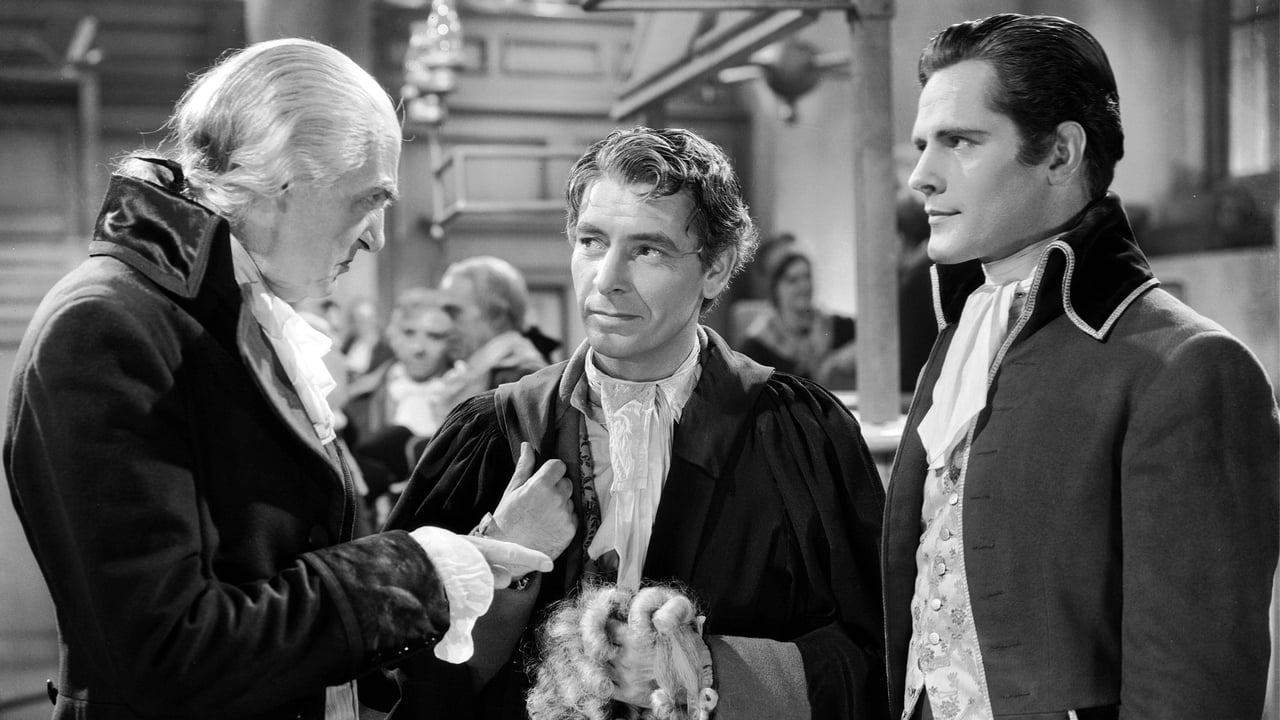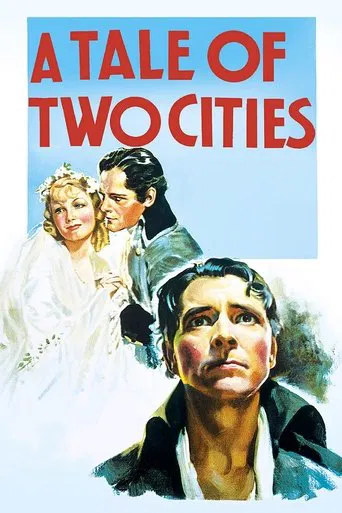



In truth, there is barely enough story here to make a film.
View MoreAll of these films share one commonality, that being a kind of emotional center that humanizes a cast of monsters.
View MoreThis movie tries so hard to be funny, yet it falls flat every time. Just another example of recycled ideas repackaged with women in an attempt to appeal to a certain audience.
View MoreThere are moments that feel comical, some horrific, and some downright inspiring but the tonal shifts hardly matter as the end results come to a film that's perfect for this time.
View MoreThat is alongside the likes of David Lean's Great Expectations and Oliver Twist. A Tale of Two Cities is a classic novel, and is just as classic a film. The costumes and sets are accurate and look beautiful, and the film is photographed handsomely. The music score is stirring, the pace and dialogue are crisp and the direction is never plodding or overdone, just right in fact(an achievement considering the massive crowd scenes). The story is compelling and mostly faithful, with the magnificent Battle of Bastille and heart-rending cut-off of the final scene between Madame La Guillotine and Sydney Carton the standout scenes. The cast are wonderful. Donald Woods is the least effective, but that's more to do with the fact that the rest are so good rather than that he's bad. Ronald Colman gives a performance of great nobility here and Elizabeth Allan does her best as Lucie, the character I always cared for least in the novel. Edna May Oliver is a warm and humorous Miss Pross and Blanche Yurka is a frightening and bitter, yet we also feel some element of sympathy, Madame Defarge. Reginald Owen is his usual solid self, same with Lucille La Verne, and while Basil Rathbone has had meatier roles in other films like Adventures of Robin Hood, Anna Karenina and Romeo and Juliet(let's not forget Sherlock Holmes either) he still makes for an excellent aristocrat. All in all, a wonderful film and one of the finest films adapted from Charles Dickens' work. 10/10 Bethany Cox
View MoreA movie begins with the words. In this case the words of the immortal Charles Dickens (and this is once when saying someone is immortal that it's not an exaggeration). But then, screen writes must take the words in the novel and condense the story down to about 2 hours of film. And it is that step that makes or breaks many a film. And here it was done brilliantly. And I really mean that. When you think of all that is in the novel "A Tale Of Two Cities", the screen writers here were able to successfully sift all those contents down into what was the crux of the story.Next is the cast. And here, the highly respected Ronald Colman, a unique actor, plays...NOT Ronald Colman. The famed mustache is missing. Instead of being sophisticated he is a drunkard (albeit one with a heart and character). In the Colman biography written by his daughter, it is said that for these reasons, this was, perhaps, Colman's favorite film. As you watch the film, however, you realize that the screen writers knew that the film was not about Sydney Carton, it was about the French Revolution. So although it is a Colman starring vehicle, his screen time is what the story demands, not what a movie star demanded. Make no mistake, here, Colman is Sydney Carton.The excellence in casting is not restricted to Colman. Elizabeth Allan is perfect as Lucie Manette. Character actress Edna May Oliver has one of her most engaging roles as Miss Pross, Lucie's servant. Blanche Yurka is a truly menacing Madame Defarge. Henry Walthall is exceptional as Dr. Manette. Walter Catlett is appropriately talented as Barsad. Claude Gillingwater is perfect as Jarvis Lorry, banker and friend of the family. H. B. Warner is unforgettable as Gabelle, the servant of an aristocrat. And, toward the very end of the film, Isabel Jewell is stunning as the Seamstress about to be executed...a brief, but memorable performance (the first few times I saw this film I thought it was an early performance by Lana Turner). Donald Woods' role as the husband-in-law of Dr. Manette and descendant of a French aristocrat has been criticized in reviews for his performance, but I'm not so sure that he's that bad; it's just that everyone else is so darned good.Should we be surprised that this is a near-perfect film? Let's see, producer -- David O. Selznick. Primary star -- Ronald Colman. Director -- Jack Conway (perhaps his finest film). Studio -- MGM.And the ending. Tastefully done. ""It is a far, far better thing that I do, than I have ever done; it is a far, far better rest that I go to than I have ever known." Perfection on film.
View MoreA great film. The best film adaptation of Charles Dickens with the possible exception of the 1951 version of A Christmas Carol. A Tale of Two Cities is perhaps the most overlooked classic film of the 30s. Dodsworth would be in that discussion too. Ronald Colma is brilliant as Sydney Carton, a clever but troubled barrister. Basil Rathbone is excellent as the heartless Marquis St. Evermonde. And even Isabel Jewel is good in the tiny part of a dainty, sacred, and condemned seamstress.I'm not sure why this movie is not as well-known as films such as Grand Hotel, The Thin Man, or My Man Godfrey. Maybe it has to do with the lack of big-name cast members. Or maybe the movie simply has to be given another 80 years before it's given its due. All I know is that I have I'm glad it's in my small film library.
View MoreI hadn't seen this movie in almost 50 years - I saw it once when I was a kid on TV. So I decided to see it again, and I'm glad I did. Dickens was not an author of subtleties, and Tale of Two Cities isn't subtle. There are the oh-so good characters, like Lucie Manette, who is boring, and her father, Dr. Manette, who is only slightly less boring. There is the evil Marquis d'Evremond, who is thoroughly evil, but not at all boring, especially as brought to life by Basil Rathbone in one of his many great performances. There are the caricatural secondary characters, such as Miss Pross, also wonderfully brought to life by the indomitable Edna May Oliver.And there is weary Sydney Carton, who sees nothing to live for and so drinks his life away. Yet Carton occasionally glimpses what his life could have been, and then, for a few brief moments, there is real depth to him. Fortunately, in a very unevenly cast movie, Carton here gets played by Ronald Coleman. And Coleman here gives a performance such as you will never forget. Yes, there is his wonderful voice with all the modulations of tone to suggest every nuance. And a face to match. While the other characters are either boring or funny or horrifying (Mme de Farge), Carton in his performance becomes a moving individual. Why Coleman didn't get at least an Oscar nomination for the part I cannot explain. (Paul Muni won it that year for playing Pasteur, a great performance, and the other four nominees were all deserving, but since in those days the nominees were not limited to 5 as they are now and since Coleman's performance is certainly as good as Spencer Tracy's in San Francisco, I do not see how Coleman got left out.)There are other things to recommend the movie as well. The storming of the Bastille is powerfully filmed. The trial scenes are grotesque and probably exaggerated, but memorable. But Coleman as Carton is remarkable, and if you haven't seen it and you enjoy a great performance, this is one to treat yourself to. The last lines (It is a far, far better thing ..., etc.) have been caricatured many times, but when Coleman recites them you won't laugh. It's truly very moving - though of course a very conservative view of the French Revolution.-----------------------I just watched this again tonight after the passage of a few more years. I'm reading the novel now to see what changes MGM made. I could go on about those, and they are interesting, but I haven't got the space necessary. The major ones come near the end, when everyone goes back to Paris. The two trials of Darnay are collapsed into one in the movie, and the reading of Dr. Manette's letter, which is VERY long in the novel, is shifted to Mme de Farge, giving Blanche Yurka the acting opportunity of a lifetime as she recounts her past and sways the jury/mob to condemn Darnay. The movie never reveals that the cowardly and opportunistic Barsad is Pross's long-lost brother. Etc.Repeated viewing makes this movie look even better. As was often the case with epic movies in the 1930s, the smaller roles here are brilliantly realized. Claude Gillingwater, the Jarvis Lorry in this version, appears well down the cast list, though his is a major role. He does a superb and, when necessary, very understated job here. Isabel Jewell, by overplaying the Seamstress in the final scene, sets off Ronald Colman's performance, which is so deeply moving for being so controlled. Blanche Yurka and Edna May Oliver, though very different, are both first rate. Pross comes off as a lovable caricature, it's true, but Yurka makes Mme de Farge a very real study in hatred. Only the romantic leads, Donald Woods (Darnay) and Elizabeth Allan (Lucie), are uninteresting. I don't know why MGM used her in both this and David Copperfield. She is so bland.But this movie is not bland, not by a long shot. I can't recommend it too highly.
View More